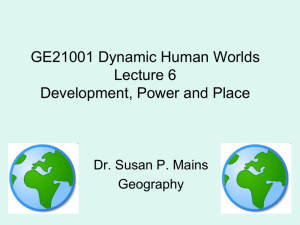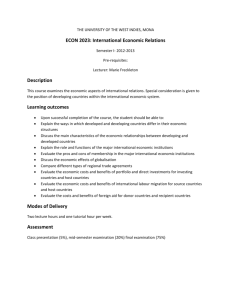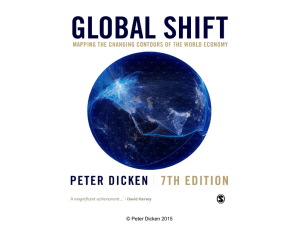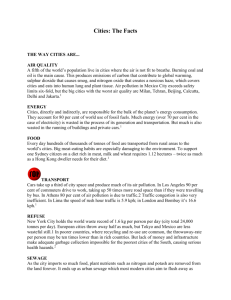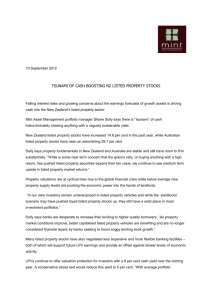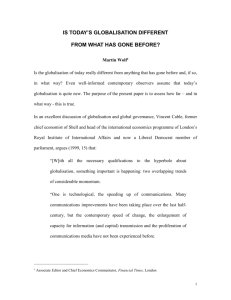Factors Causing Change in Australian Communities
advertisement
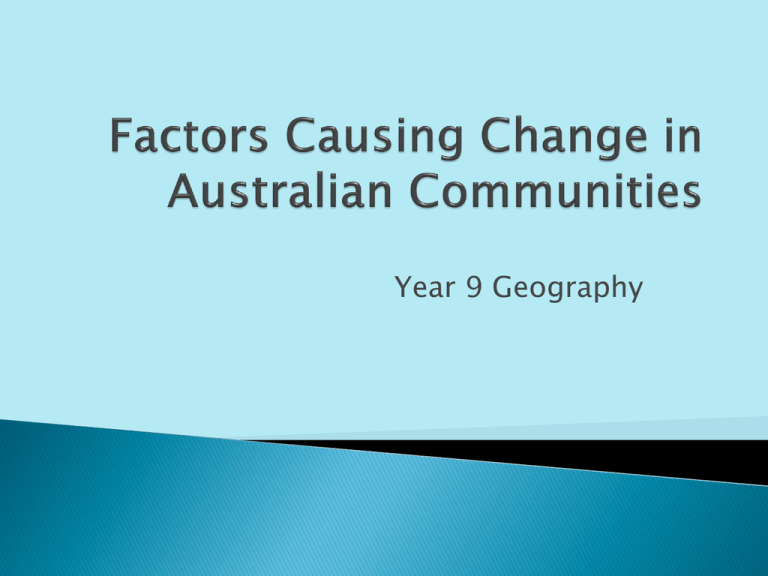
Year 9 Geography Changing nature and patterns of work Cultural Integration Demographic Change Globalisation of economic activity Lifestyle expectations New technologies Recognition of Native Title Resource Depletion 'Structural change' is an economic explanation for our changing work patterns. It refers to key work and labour force changes in Australia, such as the reduction in fulltime work. There has been a decline in full time work from 89 per cent to 69 per cent. There has been an increase in parttime and casual work. The workforce participation of women has increased from 37 to 55 per cent and the number of employed people with a bachelor's degree or higher has increased from 3 to 19 per cent. The proportion of 15 to 24 year olds remaining in our education system has increased from 35 to 54 per cent. The changing structure of work has transformed the three traditional work sectors: Primary, Secondary and Tertiary. http://content.skwirk.com.au/content/uploa d/images/Secondary/NSW/Year_10/geograph y/changing_australian_communities/tp3/ch1 /8_3_1_strucEco.swf Primary industry is the raw materials/natural resource extraction like in agriculture or mining. Eg: Farming Secondary sector involves the conversion of primary materials into goods for consumption, like car manufacturing, construction, or electricity, gas and water provision. Eg: Building The Tertiary sector refers to communication, entertainment, business, and professional and community services. E.g: Becoming a teacher or nurse Changing Work patterns ◦ Size and composition of the labour force- As baby boomers retire there will be less people in the workforce and more elderly people that will need to be taken care of. Types of jobs available ◦ There have been changes in the number of people who choose to work full time or part time. Today about 85 % of men work full time, compared to 55% of women. Is the process where different cultures become more similar and linked together. Cultural Integration is promoted through increased levels of migration, education, tourism, religion, the media and internet. Australia is a very multicultural country so it is experiencing high levels of cultural integration Globalisation is the breaking down of barriers between countries. This is due to increased international trade, finance, technology, transport advances and communications. LIST as many TNCs (Transnationals Corporations) as you can think of 1.Coco Cola 2. 3. 4. 5. 1. 2. 3. List all the different ‘brand’ names you have and use in your current world. What impact has globalisation had on you? What impact does globalisation have on communities? As people become wealthier they have come to expect more. Houses are becoming larger and more luxurious. Many families have 2 or three cars Credit card and mortgage debts are at an all time high. Australian trends show an “over-consumption culture.” Broadband, satellite Internet and 3G mobile phones have become so important that if a community does not have access they may be disadvantaged. The internet is used for banking, finance, shopping and research. Not all people can access the internet, the unemployed, the elderly, Indigenous and Non-English Speaking communities are disadvantaged. This leads to spatial inequality within communities. ◦ There is an increasing role for technology in our working lives. ◦ Technology is transforming the way we do business. For example, there is a boost in services involving the internet in the workplace. ◦ Although certain groups of workers are victims of the 'digital divide', most white collar workers have internet access and a computer at work and at home. ◦ The technological changes in the nature of work are designed to improve time, and cost and work efficiency. 1. 2. 3. Using your laptop visit Westpac, ANZ, Commonwealth Bank websites. List 3 common features that appeared on the website. How has banking on the internet changed the way people bank and pay their bills? (one paragraph) Native title is a concept of law that recognises the continued ownership of land by local Indigenous populations. This recognition leads to self determination and reconciliation. If the people of a community are reliant on natural resources such as minerals, oil, coal, natural gas and timber for employment or income, they will be affected if the resource is depleted. Ravenswood: This town is in Queensland. It was once a prosperous gold-mining town of up to 5000 residents between 1870-1920. Today Ravenswood is a ghost town of only about 100 residents. People left town when the gold began to run out and it became difficult to extract. Most buildings are old and are a feature of the town, becoming increasingly popular with tourists. Factors contributing to demographic change: Population rise through natural increase and migration means there is more of a need for education, housing, food and water Ethnic Composition and migration cause communities to become more multicultural Changes in population distribution causes communities to grow or decline (urban growth and Decline) The delay in many women getting married and having no more than 2 children on average- fertility rates drop. Demographic Change in North Sydney

